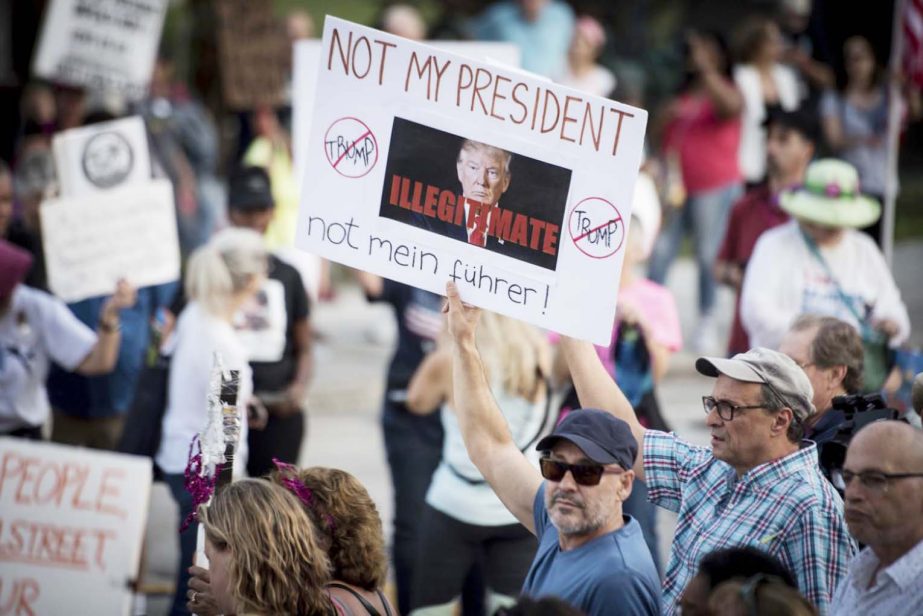
AP, Washington :
Two weeks into his presidency, Donald Trump has thrown Washington into a state of anxious uncertainty.
Policy pronouncements sprout up from the White House in rapid succession.
Some have far-reaching implications, most notably Trump’s temporary refugee and immigration ban, but others disappear without explanation, including planned executive actions on cybersecurity and the president’s demand for an investigation into unsubstantiated voter fraud.
The day’s agenda can quickly be overtaken by presidential tweets, which often start flashing on smartphones just as the nation’s capital is waking up. “The last two weeks feel like six months,” said Rep. Thomas Massie, R-Ky.
Indeed, the effect on Washington – as well as the network of lobbyists, businesses and other interest groups that orbit the political power centers – has been dizzying, beyond the normal commotion that typically accompanies a White House transition. One official compared it to walking through a sandstorm, grasping for a moment of clarity.
For Trump, a frenetic pace of activity and seemingly haphazard style is as much a part of his political brand as his signature promise to build a border wall. In business and as a candidate, he used controlled chaos to keep his rivals off balance and appears to be taking a similar approach to governing.
At times, Trump’s style has tripped up his own White House.
After an early morning tweet calling for an investigation into voter fraud, Trump’s advisers announced that the president planned to sign an order to begin an inquiry. An Oval Office event was scheduled and members of the media were assembled. But the signing was abruptly scrapped and the investigation appears to have been shelved.
The president’s advisers have taken some steps in recent days to try to alleviate some of the anxiety gripping Washington, including coordinating more closely with Republican lawmakers ahead of the signing of executive orders and giving more deference to the agencies putting in place the refugee ban.
But uncertainty still remains the capital’s prevailing mood. Just on Saturday, the departments of State and Homeland Security said they were stopping enforcement of the travel ban after a federal judge put the order on hold. The White House promised a prompt legal appeal.
Republicans who back Trump’s calls for overhauling President Barack Obama’s health care law are eager for guidance from the White House on what Trump will require in a replacement package. The insurance industry is becoming more alarmed by the day. Insurers start designing and pricing their offerings for 2018 early in the spring and there’s still no word on tens of billions of dollars in the law’s subsidies for consumers’ premiums and out-of-pocket costs.
Two weeks into his presidency, Donald Trump has thrown Washington into a state of anxious uncertainty.
Policy pronouncements sprout up from the White House in rapid succession.
Some have far-reaching implications, most notably Trump’s temporary refugee and immigration ban, but others disappear without explanation, including planned executive actions on cybersecurity and the president’s demand for an investigation into unsubstantiated voter fraud.
The day’s agenda can quickly be overtaken by presidential tweets, which often start flashing on smartphones just as the nation’s capital is waking up. “The last two weeks feel like six months,” said Rep. Thomas Massie, R-Ky.
Indeed, the effect on Washington – as well as the network of lobbyists, businesses and other interest groups that orbit the political power centers – has been dizzying, beyond the normal commotion that typically accompanies a White House transition. One official compared it to walking through a sandstorm, grasping for a moment of clarity.
For Trump, a frenetic pace of activity and seemingly haphazard style is as much a part of his political brand as his signature promise to build a border wall. In business and as a candidate, he used controlled chaos to keep his rivals off balance and appears to be taking a similar approach to governing.
At times, Trump’s style has tripped up his own White House.
After an early morning tweet calling for an investigation into voter fraud, Trump’s advisers announced that the president planned to sign an order to begin an inquiry. An Oval Office event was scheduled and members of the media were assembled. But the signing was abruptly scrapped and the investigation appears to have been shelved.
The president’s advisers have taken some steps in recent days to try to alleviate some of the anxiety gripping Washington, including coordinating more closely with Republican lawmakers ahead of the signing of executive orders and giving more deference to the agencies putting in place the refugee ban.
But uncertainty still remains the capital’s prevailing mood. Just on Saturday, the departments of State and Homeland Security said they were stopping enforcement of the travel ban after a federal judge put the order on hold. The White House promised a prompt legal appeal.
Republicans who back Trump’s calls for overhauling President Barack Obama’s health care law are eager for guidance from the White House on what Trump will require in a replacement package. The insurance industry is becoming more alarmed by the day. Insurers start designing and pricing their offerings for 2018 early in the spring and there’s still no word on tens of billions of dollars in the law’s subsidies for consumers’ premiums and out-of-pocket costs.

